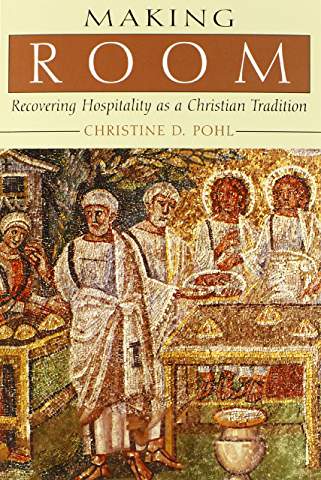The Loneliness Epidemic
It appears as though Americans are undergoing what one writer described as a “loneliness epidemic.” Actually, a close look at the statistics makes a thoughtful person wonder if it isn’t a pandemic that we are facing. In a recent study conducted by Cigna, the health-insurance company, some 46 percent of the 20,000 people surveyed reported that they often felt alone, overlooked or left out. In that same survey, some 13 percent said there were zero people who knew them well. In the “Briefing” page of a January 2019 issue of The Week, former U.S. Surgeon Attorney General Vivek Murthy is quoted as saying, “During my years caring for patients, the most common pathology I saw was not heart disease or diabetes. It was loneliness.” The Week article attempts to define the concept of loneliness as “the emotional state created when people have fewer contacts and meaningful relations than they would like—relationships that make them feel known and understood.” The article goes onto make the following points. • Between
1985 and 2009, the average American’s social network shrank by more
than one-third, defined by the number of close confidants. The results of this societal alienation are often tragic. A 2010 study by Brigham Young University found that loneliness shortens individual lives by 15 years (this is roughly the same impact caused by the habit of smoking 15 cigarettes a day or of being obese). “Other studies have found connections between loneliness and a wide range of health problems, including increased risk for heart attacks, stroke, and cancer. Lonely people are more likely to suffer from insomnia, depression, and drug abuse. They are more likely to suffer from more rapid cognitive decline as they age.” In addition, and without a doubt in my mind, the result of loneliness is the increasing and alarming incidence of suicide in the general population and in the college-age segment of society. According to statistics reported by the National Institute of Mental Health, the Centers for Disease Control and Prevention, etc., etc., suicide is the tenth leading cause of death among adults in the United States. Each year it claims the lives of nearly 45,000 people, with unsuccessful suicide attempts ranging around 250,000. Suicide was the second leading cause of death among individuals between the ages of 10-34, and the fourth leading cause of death among individuals between the ages of 35 and 54. In relationship to the yearly total of homicides in the United States (some 19,362), the stats reveal that there were more than twice as many suicides. Through the grade-school years, we raised our children in Oak Park, Illinois. At that time, protocols for neighborliness were well in place. If a new family moved in on the block, nearby neighbors would greet them with a plate of cookies or a home-cooked meal or an invitation to dinner. There were regular neighborhood events, headed up by a “block captain.” We joined together for the annual summer block party, held regular coffee-klatches so we got to know one another, watched one another’s kids if someone had to run an errand. I knew the name of everyone on the block—that would be the inhabitants of some twenty separate households. At the end of summer, when our kids all went back to school, neighbors gathered at our home to celebrate special days or ordinary days. We shared recipes, lingered on porch steps to chat and borrowed ingredients that were missing in our cupboards. Today, if you move into a new neighborhood, in order to connect with people up and down the street, you probably are going to have to bake a bunch of breads, go door to door and say, “Hey! We’re your new neighbors! We just wanted to introduce ourselves and become a little acquainted with the folk on our block!” Well, obviously, as someone who has written what many consider the “classic” on spiritual hospitality (Open Heart, Open Home), and as someone who gets positively tingly with excitement when guests are scheduled to drop in, I am convinced that an easy and obvious cure for this loneliness epidemic is the practice of that old concept of welcome, of invitation, of inclusion and of glad-hearted reception. Do you know how many times the instruction to be hospitable is mentioned or modeled in the Old and New Testaments? (Martha Stewart has nothing on the Bible.) If Christians in this country begin to open their hearts and homes again; if rural and suburban and urban churches would challenge themselves to extend ministries of inclusion—well, we could change this country! We could defeat this tragic social epidemic! What do you think? Because the Lord has extended my life (I’m eating better after a 7-month journey through dysphasia—an eating disorder in which I lost some 43 pounds, had three hospitalizations, three endoscopies, and two surgeries), I am now also experiencing rather unwelcome Holy Spirit encounters. He keeps nudging me, waking me up from perfectly good sleep: In other words, He keeps nagging at me. I have finally set my mind toward the design of a national platform of some kind, yet to be defined, that will take a whack at encouraging the use of this great gift of hospitality as this national epidemic of loneliness rages. BUT I AM 76 AND I AM GOING TO NEED SOME HELP. We have one part-time employee, no (let me repeat that, NO) reserves of funds, and I am well into the last quarter of life. Yet, I am willing. I know the topic of hospitality inside and out. David and I have spent a good deal of our lives going out on limbs no one else was ready to swing from, so the concept of starting some major initiative is not scary, it’s just that there’s that tick-tock, tick-tock, tick-tock of an inevitable end-of-life countdown. Yet, I’m already gathering stories of extraordinary folks who are making a radical difference in their society through the exercise of this amazing spiritual gift. More of that to come in future issues of Soulish Food. For right now, I just wonder if you would ask the Lord if he wants you to be part of this hospitality initiative team. “Alright. Alright,” I can hear some of you saying as a result of your own nighttime nudges, “I’ll help the crazy, white-haired 76-year-old out. What do you want me to do?” Take your pick. This initiative will need strategic thinkers, technology nerds, journalists who can write about hospitality examples that already exist and are making a difference and about churches that already exist and are making a difference in their communities. This initiative will need big-thinker types and hands-on worker-bee types. We will need grant writers and corporations that can fund growing operations. We will need podcasters and bloggers and a speakers’ forum. And everyone needs to volunteer to get this launched without expecting any financial returns. (We will also need a really catchy name.) So here’s my prayer:
The
next Soulish Food will cover the topic of Openhomeaphobia. Simply
put: We can’t overcome the epidemic of loneliness until we conquer
the neurosis of being afraid to open our homes. Reminder!The Soulish Food e-mails are
being
posted biweekly on the Hungry Souls Web
site. Newcomers can look that over and decide if they want to
register on the Web site to receive the biweekly newsletter. You might
want to recommend this to friends also. They can go to www.HungrySouls.org. Hungry Souls Contact InformationADDRESS: 29W377 Hawthorne Lane |
 David & Karen Mains I am convinced that an
easy and obvious cure for this loneliness epidemic is the practice of
that old concept of welcome, of invitation, of inclusion and of
glad-hearted reception.
BOOK CORNER
Making Room: Recovering Hospitality as a Christian Tradition by Christine Pohl As much as I like to hear the word “classic” attached to the title of my book on hospitality, Open Heart, Open Home, on hospitality, in my mind, Christine D. Pohl really deserves the commendation due to her work in Making Room: Recovering Hospitality as a Christian Tradition.
An Asbury professor, Pohl looks at the long history of hospitality as
this outreach has been exercised by the church, inside the walls and
outside through various faith-based institutions in ways that truly
conform to the great tradition of Christian faith. The
author writes, “Because hospitality is basic to who we are as followers
of Jesus, every aspect of our lives can be touched by its practice. If
we use hospitality as a lens through which to examine our homes,
churches, jobs, schools, health care, and politics, might we see them
differently? Can we make the places which shape our lives and in which
we spend our days more hospitable? Do current practices within these
settings distort hospitality or shut out strangers?” Look
through these pages at the history and movements and communities
centered in Christian faith that through the centuries have extended
this gift, with open heart and without any expectations of repayment,
to those in the world who needed a little mercy, a safe place, shelter
from the storms, a place by the fire, food for the belly, laughter and
conversation and most of all, most of all, welcome. I highly recommend, if you have not already done so, that you order a copy and underline it as you read. Or, if you have already read it, I highly recommend you read it again. I, myself, am going to do just that. Buy Making Room from Amazon.com |

